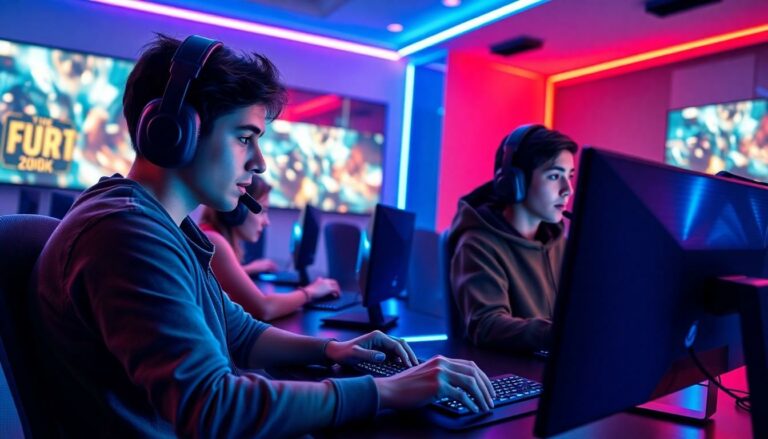The Best Fluffy Pancakes recipe you will fall in love with. Full of tips and tricks to help you make the best pancakes.

Gamers and Remote Control Vehicles: The Fusion of Digital and Physical Play
In 2024, over 3.3 billion people were estimated to be active video game players globally, while the remote control (RC) vehicle industry reached a market value of over $9.7 billion—with a projected compound annual growth rate (CAGR) of 6.5% through 2030. These numbers point to a growing overlap between two thriving communities: gamers and RC enthusiasts. As technology continues to evolve and immersive experiences become more mainstream, the fusion of digital gaming and remote control hobbies is creating a unique space that blends virtual strategy with real-world action.
A Shared Passion for Control and Precision
At the heart of both gaming and RC vehicle operation lies a shared emphasis on control, precision, and mastery. Whether it’s guiding a drone through an obstacle course or executing a complex combo in a competitive fighting game, both activities require hand-eye coordination, quick reflexes, and a deep understanding of mechanics—be they digital or physical.
Gamers often find transitioning into RC hobbies a natural progression. Many of the skills developed through years of gaming, such as situational awareness, spatial reasoning, and real-time problem solving, translate seamlessly into piloting RC vehicles. For example, drone racing demands the same level of attention and fast-paced reaction time as high-intensity games like Call of Duty or Rocket League.
The Tech Appeal: Hardware and Customization
Another major reason gamers are drawn to RC vehicles is the appeal of customization and technology. In the gaming world, enthusiasts spend hours tweaking their PCs or gaming rigs, upgrading graphics cards, and optimizing settings. RC vehicle enthusiasts exhibit similar behaviors—swapping motors, modifying suspension systems, or tuning their drones for optimal flight speed and maneuverability.
For tech-savvy individuals, RC vehicles provide a satisfying hands-on outlet. Building and modifying RC cars or drones can feel like crafting a real-world version of the gear customization seen in games like Gran Turismo or Cyberpunk 2077. It’s common for gamers-turned-RC fans to frequent a local or online RC shop for parts, upgrades, and advice—much like how gamers invest in peripherals to enhance their digital performance.
Simulation and the Rise of Virtual RC
The overlap between gaming and RC doesn’t end in real life—many games and simulators focus specifically on RC vehicle operation. Titles like Liftoff: FPV Drone Racing and Re-Volt allow players to simulate RC experiences with a high degree of realism. These games not only entertain but also serve as training tools for real-world RC enthusiasts.
Flight simulators for drones, in particular, have gained traction. They provide a risk-free environment to learn complex maneuvers and controls before taking an expensive drone into the air. Gamers who are used to virtual environments find these simulators an ideal stepping stone to real-world RC flying. This blend of digital and physical skill-building has further deepened the connection between gaming and remote control hobbies.

Esports Meets RC Racing
Competitive gaming, or esports, has exploded in popularity, and some RC disciplines are beginning to follow suit. Organized drone racing, for example, now includes professional leagues such as the Drone Racing League (DRL), which features LED-lit courses and high-speed drone pilots competing in front of live and virtual audiences. The production values and competitive structure are heavily inspired by traditional esports, including commentators, real-time data overlays, and professional sponsorships.
Gamers are often attracted to these emerging sports because they combine familiar elements—fast-paced action, competitive formats, and strategic gameplay—with the excitement of real-world risk and motion. Many RC competitions now even feature augmented reality (AR) elements or stream their matches online, blending digital and physical experiences in ways that are compelling to both gamers and RC enthusiasts.
Social Connection and Community
Both gamers and RC hobbyists thrive in community-based ecosystems. Online forums, Discord servers, and Reddit threads are filled with discussions about RC builds, racing techniques, drone footage, and simulator setups. These digital communities mirror the camaraderie found in gaming clans or guilds, allowing people to connect over shared interests and exchange knowledge.
Local events such as RC car races or drone meetups are also increasingly drawing in gamers looking to socialize in person. These gatherings allow participants to show off custom builds, test new technology, and collaborate on challenges—all of which mirror the collaborative nature of multiplayer gaming.
The Future: VR, AI, and Autonomous RC
Looking ahead, the convergence of gaming and RC vehicles is likely to deepen as technologies such as virtual reality (VR), artificial intelligence (AI), and real-time remote piloting become more sophisticated. Imagine piloting a drone through a forest using a VR headset, or programming an AI-driven RC car to navigate a course autonomously, using gaming-inspired strategy algorithms.
As these technologies evolve, the barrier between the digital and physical worlds will continue to shrink, creating even more immersive and hybrid experiences. For gamers seeking a new thrill and hobbyists looking to level up, the world of RC vehicles offers the best of both worlds—adrenaline-fueled fun with a strong dose of creativity and competition.




